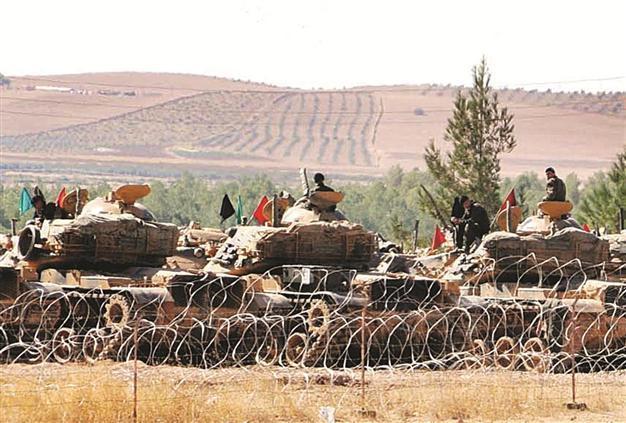ISIL reminds Turkey it cannot neglect anti-terror capabilities
Burak Bekdil

Tanks deployed to Turkey’s Syria border are seen in this file picture. The rise of the ISIL will require Ankara to maintain readiness to fight various forms of asymmetrical war against factions of jihadists, analysts say. DHA photo
Turkey’s more than three-decade-old fight against Kurdish insurgents took a sluggish turn a couple of years ago thanks to a fragile cease-fire, prompting procurement officials to go more for strategy and gear for conventional wars.But the recent advance of the Islamic State of Iraq and the Levant (ISIL) and the fall of the Iraqi city of Mosul are forceful reminders to Ankara that it cannot neglect preparedness for asymmetrical warfare.
Analysts say the prospects of an established existence in areas just south of what Turkish diplomats call “a Kurdish security belt stretching from northeastern Iraq to parts of northwestern Syria” will require Ankara to maintain readiness to fight various forms of asymmetrical war against factions of jihadists.
“The fall of Mosul and the subsequent events have revealed that Turkey’s conventional forces cannot be used to effectively fight irregular armies like ISIL,” said one Ankara-based analyst. “In a way, ISIL has unveiled the Turkish army’s unpreparedness for cross-border asymmetrical warfare.”
“This will be a more difficult fight for the Turks than the one they staged against the Kurdish insurgents until recent years,” said one Washington-based analyst along the sidelines of a conference in Istanbul. “When you face an enemy that comes in numerous factions, colors and flavors, you will have serious hurdles in intelligence gathering which can be essential in any cross-border asymmetrical fight.”
“From whichever angle one looks, the Syrian crisis is a nightmare come true for Turkey. By quickly deciding to side with the rebels and insisting on [Syrian President Bashar] al-Assad’s overthrow, Ankara transformed itself into an unwavering belligerent in this conflict. As negative as the consequences of the stalemate have been so far, they could have been a great deal worse. Paradoxically, the Turkish government, which has had unending troubles at home with its varied opposition, has managed the negative fallout from Syria rather well. The question is, how long can it continue to do so?” said Henri Barkey, a professor of international relations at Lehigh University.
Iraq and Syria 'mesh into one theater'
After initial support for Islamist groups fighting al-Assad and under pressure from Washington, Turkey finally designated al-Nusra, another al-Qaeda offspring, as a terrorist organization last month. But just when the Turks eventually agreed to cooperate with the United States and European Union to track and apprehend the jihadists, the mightiest of Islamist groups – ISIL – took 49 Turkish diplomats and their family members hostage at the country’s consulate in Mosul.
“The Syrian and Iraqi theaters of civil conflict have now finally meshed into a single one,” said Barkey. That merger, according to the Ankara-based analyst, may force Ankara to revise its procurement strategy in favor of gear and strategies designed to counter asymmetrical threats, rather than prioritizing conventional weaponry. Analysts agree that Turkey must improve intelligence and cross-border surgical operation capabilities and border security if it wants to better fight any future jihadist threat from its southern or southeastern borders.
Turkey had long been considering the purchase of a surveillance balloon and related ground stations from Lockheed Martin to better fight the Kurdish insurgents, but this plan was subsequently placed on the back burner before being shelved amid the fragile cease-fire with the Kurds. Now it could be revived to boost border security.
Officials and defense industry experts say that satellites may often provide belated input due to the nature of satellite imagery, but input from a surveillance balloon would often come close to real-time. An army official said that one imminent strategy could be to deploy, with appropriate gear, mobile rapid reaction troops along Turkey’s 900-kilometer border with Syria.
















